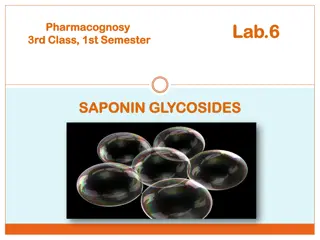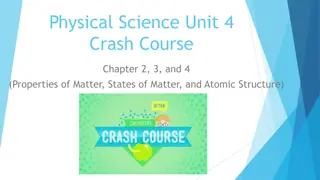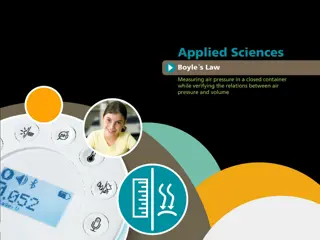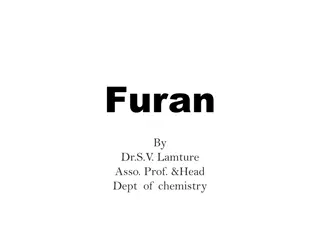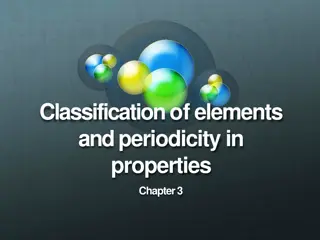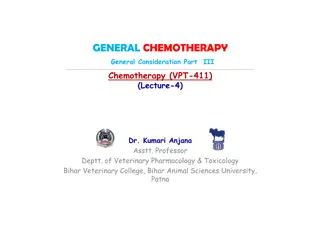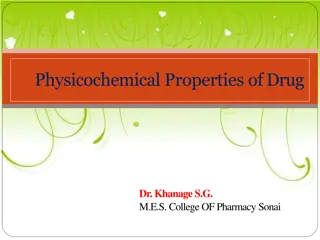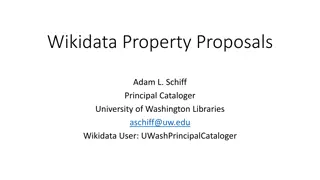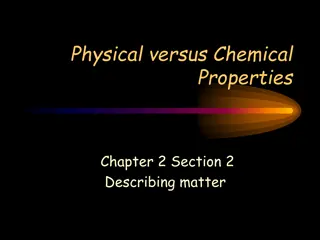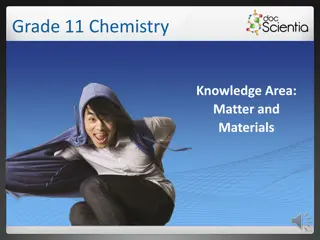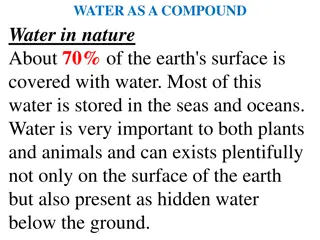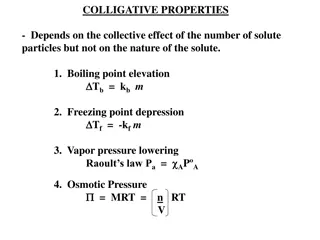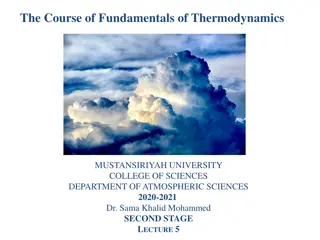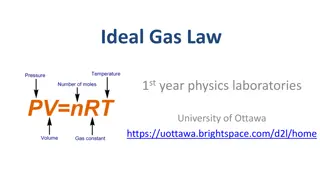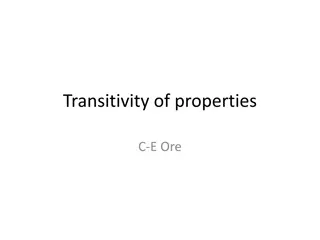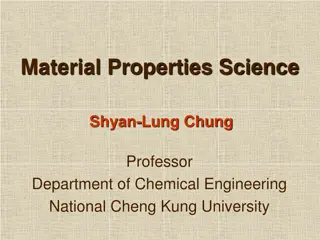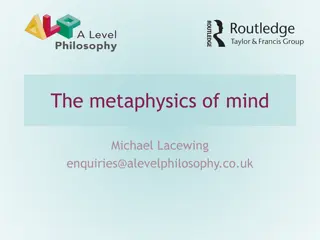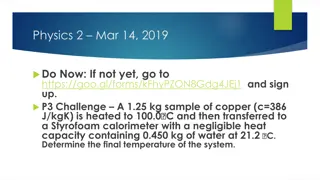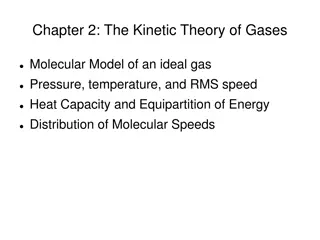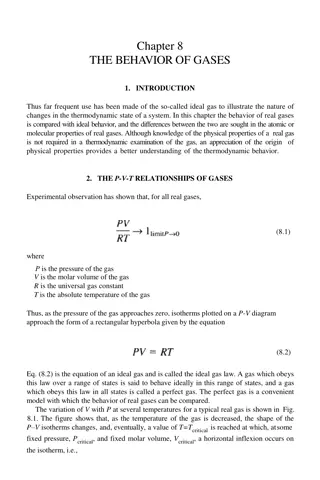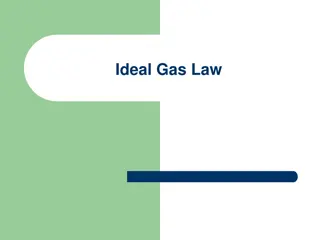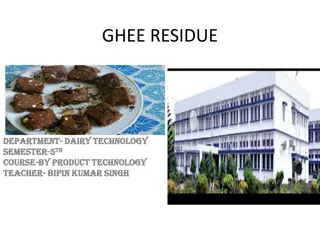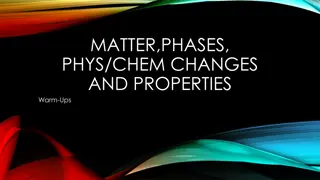Understanding the Rule of Mixtures in Composite Materials
The Rule of Mixtures (ROM) is a weighted method for predicting the properties of composite materials, such as fiber-reinforced polymers (FRP). This method relies on assumptions regarding the homogeneity and properties of fibers and matrices. By combining volume fraction and properties linearly, the
5 views • 23 slides
Understanding Saponin Glycosides in Pharmacognosy: Properties and Applications
Saponin glycosides, found in various plants, are compounds with diverse benefits ranging from cholesterol regulation to potential anticancer properties. They form colloidal solutions in water and are used in soap manufacturing due to their unique properties. Additionally, saponins have bitter taste,
6 views • 18 slides
Understanding Properties and States of Matter in Physical Science
Matter is made up of elements that cannot be broken down further. Different mixtures have distinct properties, such as solutions, colloids, and suspensions. Physical properties like viscosity and density can be observed without changing the material's composition. Chemical properties, like flammabil
2 views • 15 slides
South East Asia Collagen
Collagen, with its unique properties, has been extensively used in food processing industries. These properties are usually categorized into two groups. First, the properties associated with its gelling behavior, such as texturizing, thickening, gel formation, and water binding capacity, and second,
0 views • 2 slides
Guidelines for Handling Case Properties and Seized Assets in Legal Proceedings
This informative content discusses the handling of case properties involved in offenses, including seizure, custody, disposal, and coordination among government departments. It covers various aspects such as the types of case properties, custody procedures, provisions under Section 516-A Cr.PC, and
0 views • 8 slides
Investigating Boyle's Law: The Relationship Between Air Pressure and Volume
Explore the fascinating relationship between air pressure and volume of a confined gas at constant temperature through an experiment testing Boyle's Law. Learn about the historical context and theoretical foundation behind the behavior of gases, including the concept of ideal gases and the Boyle-Mar
0 views • 24 slides
Understanding Furan and Thiophene: Structures, Properties, and Uses
Furan and Thiophene are important heterocyclic organic compounds with distinct structures and properties. Furan, a five-membered aromatic ring, is used in specialty chemical production and has unique physical properties. Thiophene, a sulfur-containing compound, finds applications in agrochemicals an
2 views • 8 slides
Classification of Elements and Periodicity in Properties: Overview and Evolution
The journey of understanding the classification of elements and periodicity in properties begins with early laws like the Law of Triads and Newland's Law of Octaves. Mendeleev's Periodic Law revolutionized the organization of elements, leading to the modern periodic table. Discoveries of eka-alumini
3 views • 32 slides
Ideal Antimicrobial Agents and Antimicrobial Classification Overview
This lecture on general chemotherapy outlines the properties of ideal antimicrobial agents, emphasizing selective and effective activity, bactericidal action, non-toxicity, and more. It also covers the classification of antimicrobials based on chemical structure, including sulfonamides, diaminopyrim
6 views • 19 slides
Understanding Physicochemical Properties of Drugs
The physicochemical properties of drugs play a crucial role in their pharmacological effects. These properties include physical and chemical characteristics that influence interactions with biomolecules. Solubility, partition coefficient, and dissociation constant are key factors affecting drug beha
1 views • 46 slides
Algebra Rules and Properties
Explore the fundamental rules and properties of algebra and indices, including commutative, associative, and distributive properties. Learn about negation, zero properties, and the zero factor property, illustrated with examples and common errors. Engage in activities to apply and test your understa
1 views • 21 slides
Understanding Wikidata Properties and Data Types
Learn about Wikidata properties and data types, their importance in structuring data, and how they are used to create statements and qualifiers in Wikidata. Explore the purpose of properties, their labels, descriptions, aliases, and data types such as items, strings, monolingual text, external ident
0 views • 26 slides
Understanding Physical and Chemical Properties of Matter
Explore the distinction between physical and chemical properties of matter in Chapter 2, Section 2. Physical properties can be observed without changing the substance's identity, such as color and density, while chemical properties require altering the substance to observe characteristics like react
5 views • 20 slides
Understanding Nonelectrolytes in Solutions
Physical properties of substances are classified into colligative, additive, and constitutive properties. Colligative properties depend on the number of particles in a solution and are similar for different nonelectrolytes. Additive properties are based on the total contribution of atoms, while cons
1 views • 14 slides
Ideal Gas Laws and Thermal Properties in Chemistry
Understanding ideal gas laws and thermal properties is crucial in chemistry. The relationship between temperature, volume, and pressure is explored through Charles's law and Gay-Lussac's law. The concept of absolute zero, extrapolating graphs, and the direct proportionalities between gas properties
0 views • 6 slides
Steps to an Ideal Year of Scouting for Scout Units
Providing an ideal year-round quality scouting program involves planning, funding, growth, training, rechartering, and assessing to create a stronger program with increased parental involvement, more Scouts, camp participation, reduced out-of-pocket expenses, ample funds, and simplified, more enjoya
0 views • 32 slides
Water as a Compound: Essential Properties and Properties
Water, a vital element covering 70% of the Earth, is composed of hydrogen and oxygen. It has various physical and chemical properties, acts as a universal solvent, and plays crucial roles in nature. From boiling and freezing points to chemical reactions, water's significance is undeniable. Its sourc
0 views • 63 slides
D-Block Elements: Properties and Classification in Chemistry
Welcome to the Department of Chemistry at Kisan Veer Mahavidyalaya, Wai. Explore the Chemistry of Elements of the 3d series, focusing on d-Block Elements and Transition Elements. Learn about their electronic structure, colored ions, magnetic properties, oxidation states, and complex formation. Under
0 views • 34 slides
2020 Company Confidential - Add-Ons and Variable Properties Guidelines
This document provides guidelines for add-ons and variable properties within the context of the 2020 Company Confidential data. It covers various aspects such as variable validations, logic return types, export/import considerations, and the handling of accessory items. The content emphasizes the pr
0 views • 39 slides
How to Define and Utilize Your Ideal Customer Profile_
In today\u2019s competitive business landscape, understanding your ideal customer profile (ICP) is crucial for driving growth and ensuring long-term success. An Ideal Customer Profile is a detailed representation of the type of customer who would ben
0 views • 18 slides
Understanding Colligative Properties in Solutions
Colligative properties in solutions depend on the total concentration of solute particles present, impacting properties such as boiling point elevation, freezing point depression, vapor pressure lowering, and osmotic pressure. Boiling point elevation is directly proportional to the number of solute
1 views • 19 slides
Fundamentals of Thermodynamics: Historical Laws and Principles
This lecture explores the historical overview of thermodynamic laws, including Boyle's Law, Charles' Law, and Gay-Lussac's Law. It delves into the relationships between pressure, temperature, volume, and amount in ideal gases, providing useful insights for meteorologists and atmospheric scientists.
0 views • 23 slides
Understanding Physical and Chemical Properties of Matter
Explore the distinction between physical and chemical properties of matter in Chapter 15, Section 2. Learn to classify properties such as color, flammability, odor, shape, taste, density, and more. Understand how physical properties can be observed without altering the substance's identity, while ch
0 views • 17 slides
Discover Ideal Housing Options in Vancouver Area
Ideal housing options in Vancouver area are available, ranging from basement suites to townhouses. Features include private bathrooms, pet-friendly policies, wood flooring, laundry facilities, multiple bedrooms, kitchens, proximity to transportation, and a smoke-free environment. Various properties
0 views • 11 slides
Investigating Ideal Gas Law: Pressure, Temperature, and Volume Relationship
Explore the relationship between pressure, temperature, volume, and number of gas molecules in a closed system through an experiment based on the Ideal Gas Law at the University of Ottawa's first-year physics laboratories. The experiment aims to determine if air behaves as an ideal gas and find the
0 views • 13 slides
Philosophy of Plato: The Ideal State and Its Principles
Plato's Republic presents the concept of the ideal state governed by a philosopher king, with distinct classes and systems of communism in property and family. The state emphasizes functional specialization, justice, and totalitarian control but faces criticisms for lacking individual freedom, retai
0 views • 5 slides
Understanding Transitivity of Properties in Typed Systems
Exploring the concept of transitivity in properties within a typed system, this content delves into explicit and possibly transitive properties, showcasing how properties relate to each other and how they can be implicitly or explicitly defined. Through examples and explanations, the content provide
0 views • 18 slides
Comprehensive Course on Material Properties and Science
Delve into the world of material properties and science with a course led by Professor Shyan-Lung Chung from the Department of Chemical Engineering at National Cheng Kung University. Explore topics ranging from atomic scale structures to mechanical properties and their applications, supported by opt
0 views • 10 slides
Exploring the Metaphysics of Mind: Substance, Properties, and Views
Delve into the realm of metaphysics as it pertains to the nature of reality, with a focus on substance and properties. Explore the concepts of substance dualism, monisms like idealism and materialism, and the debate around mental properties and their relation to physical properties. Consider various
0 views • 8 slides
Understanding Thermal Physics and Gas Laws in Physics Class
Explore the concepts of thermal physics and gas laws in today's physics class. Learn about the transfer of heat, the mole concept, atomic and molar masses, pressure, standard pressure and temperature (STP), and ideal gases. Delve into calculations involving sample materials like copper and water to
0 views • 20 slides
Understanding the Kinetic Theory of Gases and Ideal Gas Model
Explore the Kinetic Theory of Gases, the Molecular Model of Ideal Gases, and concepts like pressure, temperature, and heat capacity. Understand the fundamental properties of gases, including the distribution of molecular speeds and equations that describe gas behavior. Learn about the mole concept,
0 views • 23 slides
Understanding the Behavior of Gases: A Comparison of Real and Ideal Gases
This chapter delves into the behavior of gases, contrasting real gases with the ideal gas model. It explores the P-V-T relationships of gases, highlighting the differences between ideal and real gas behaviors based on molecular properties. The critical point where coexisting gas and liquid phases co
0 views • 40 slides
Understanding Heat Treatment in Steel Alloys
Heat treatment is a crucial method to modify the physical and chemical properties of materials like steel. The amount of carbon in plain carbon steel determines the heat treatment required, influencing properties like hardness and machinability. Different types of heat treatment include annealing, n
0 views • 21 slides
Understanding the Ideal Gas Law in Chemistry
Exploring the concept of the Ideal Gas Law, its derivation from the combined gas law, conversion of pressures, practical applications through problem-solving examples, and the significance of the gas constant (R) in calculations. Learn how to use the Ideal Gas Law formula (PV = nRT) to solve for var
0 views • 19 slides
Understanding Ghee Residue: Properties, Yield, and Applications
Titled "Understanding Ghee Residue: Properties, Yield, and Applications", the content delves into the by-product of ghee manufacturing known as ghee residue. Highlighting its physico-chemical and functional properties, lipid content, milk sugars, flavoring profiles, antioxidant properties, and fat r
0 views • 12 slides
Understanding Ideal and Real Diodes in Electronics
In electronics, an ideal diode behaves like a perfect switch with no voltage drop when forward biased and acts as an insulator with zero current when reverse biased. On the other hand, a real diode has a barrier potential and forward resistance to overcome when conducting current. The I-V characteri
0 views • 17 slides
IDEAL-GAME Project Meeting and Creator Tool Development in Spain
Join the IDEAL-GAME project meeting in Madrid, Spain, focusing on learning scenarios, book design, and usability testing for the Online Serious Game Creator. Explore the Technology Acceptance Model (TAM) and gain insights into questionnaire design. Participate in enhancing higher education through i
0 views • 11 slides
Entity-specific Rankings of Knowledge Base Properties
Towards entity-specific rankings of knowledge base properties, this research explores the problem of property ranking for entities based on their attributes and properties. Various applications in knowledge base curation and natural language generation are discussed, along with related work in entit
0 views • 26 slides
Near-UV Satellite Observations for Retrieving Aerosol Properties
Near-UV satellite observations offer a valuable method for retrieving aerosol properties, including aerosol optical depth, absorption, layer height, and surface albedo. These observations provide advantages like sensitivity to aerosol properties and negligible gas absorption interference. However, c
0 views • 16 slides
Understanding Matter: Properties, Changes, and Classification
Explore the classification of properties and changes in matter, including physical and chemical properties, extensive and intensive properties, pure substances versus mixtures, and homogeneous versus heterogeneous mixtures. Learn about pollution-producing processes involving physical changes and the
0 views • 7 slides

